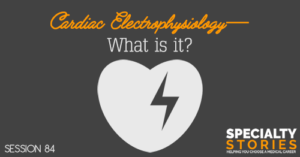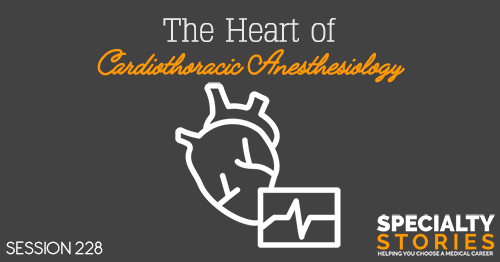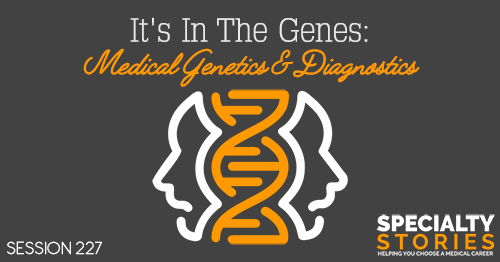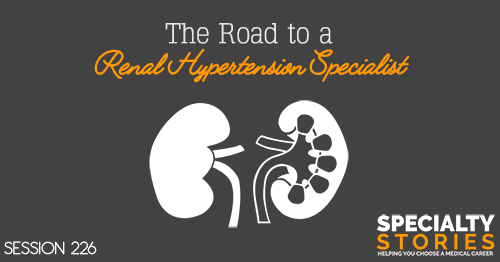Apple Podcasts | Google Podcasts

Session 84
Dr. Edward Schloss joined me to talk about his journey to Cardiac Electrophysiology, what 17 years in the field looks like, and his likes and dislikes of his specialty.
If you’re a premed student, go check out all our other resources on MedEd Media Network. If you’re a medical student, go check out our newest Board Rounds Podcast.
[01:17] Interest in Cardiac Electrophysiology
Coming out of undergrad as an engineer, Edward wasn’t sure he wanted to be a doctor and only found out as he got further along. It was during second year of med school that he had an ECG class and they were already problem-solving instead of just plain memorization. He also got through different phases such as rheumatology, nephrology, and primary care. In fact, he recalls telling himself one evening that he wasn’t going to be a cardiologist.
He actually got interested in serial drug testing back in the old days, where they would take people who had cardiac arrest into a lab and they would pace their hearts in order to induce the arrhythmia. They would start the medication and bring them back and do it again. Until he got to the people that did electrophysiology and got mentorship.
[04:05] Traits that Lead to Becoming a Good Electrophysiologist
Edward says you have to be analytic. You have to be able to look at data objectively and there are going to be mountains of data and you have to sort through the good and the bad. In the lab, you have to be highly meticulous. You have to be focused and meticulous for hours on your feet to be able to get through that.
Moreover, establishing relationships with patients is also super important. They don’t meet patients on the table, but they meet them ahead of time. They deal with people that are very vulnerable and intimidated. Many of them have been through something life-changing. They’re facing the risk of cardiac arrest or they’ve been through it. Or they’re scared to death about their arrhythmias. So you need to humanize it and gather their trust before they hit the lab. And for many of these patients, you follow them for many years. Having a lot of device patients, they have metal in their body that he’s responsible for, for the rest of their life.
'These people have a hunk of metal in their body that I'm responsible for for the rest of their life so they're kind of married to me professionally.'Click To Tweet[06:10] Types of Patients and Diseases
Edward illustrates a mix of patients coming in. There are young people with palpitations, fainting episodes, which are common. As they get older, you start to see patients who may be healthy but have developed atrial fibrillation from a variety of causes. As you go further to the older population, you’d see patients with myocardial infarction and then you get to the heart failure population as they get older. Edwards favorite is the 90-year-olds who may have a heart block and fainting episode and you put a pacer in them and they’re good to go.
Edward has a good number of referring physicians, mostly his own partners. When patients hit the door, it’s not unusual for them to be ready to go. So they’ve probably had their echo or their medications, etc. A lot of times, they don’t know what they need which is pretty common. So it’s common for Edward that he’d have to craft the patients’ expectations a little differently.
'If they think they know what they need, much of the time they're wrong. That's not because they're not good doctors. It's just our field is so highly specialized.'Click To Tweet[08:55] Typical Day
Edward arrives before 7 am, depending on how much is going on in the hospital. He runs around and sees his post ops. It’s very important to see people the day after their procedure personally to cement the relationship. Then he makes it to the lab or the office by 8 am. His days are generally either all day lab or all day office. On an office day, he’ll see patients from 8-8:30 and from 8:39 to 5 or so, he sees his patients. Some days can be light, others can be busy.
On a lab day, they do procedures that can sometimes take a short amount of time. Sometimes, it takes several hours. It’s hard to predict which number of hours. Typically, his day is done by around 6 pm.
[10:29] Community vs Academic
Edward chose the community setting over academic. He was one of the aggressive fellows who felt ownership over his patients. He jokes around that by the time he got done he was a “PGY-8” which just means that it takes a long time to become an electrophysiologist. So feel kind of ready for it and want to do things yourself. So he hated it when his attendings would lean over his shoulder and take control of the catheters or do access. He realized once he got out of practice that he wasn’t going to change. So if he had to do an academic practice and had to teach fellows and give them control, then he would have a tough time with that. Then he found research later in his career but he tried to skirt away from it as much as he could. He did enjoy teaching but he wasn’t sure if he was going to be patient about it.
[12:33] Percentage of Procedures and Taking Calls
If somebody hits his door as new patient evaluation, he does a procedure on them of about 75%. For the 25%, he sees a lot of people come to him for benign palpitations and sometimes all they need to do is put on a monitor and determine they’re benign and reassure. This doesn’t lead to a procedure.
Basically, taking calls has evolved over the course of his career. Most electrophysiologists he’s talked with would like to be purely electrophysiology on call. But it took a long time to get to that point. He’d take calls every fifth night and every fifth weekend. He used to do general cardiology call. Then as they got bigger and built an electrophysiology-specific call, the calls got less frequent. But as it got less intense, it became high acuity calls and in many cases, they’re very knowledge-based, difficult, complex calls.
[15:25] Work-Life Balance
Edwards admits going through periodic retirement fantasies, not because he doesn’t love his job, but because he just loves his home life. He’s got a phenomenal family and a great place to live. So he enjoys being away from the hospital. Weekends he just shuts everything down so he can stay at home and have a nice time.
'When you're here, you've got to be here. So you've got to actually devote yourself to that.'Click To Tweet[16:30] Training Path to Become a Cardiac Electrophysiologist
You start out as an internal medicine resident after medical school which is three years. And then you decide whether you go to cardiology and get a cardiology fellowship which is another three years of general cardiology. Then you subspecialize and choose electrophysiology. Depending on what program you’re in, that might be combined into the general cardiology program, or it might be a separate fellowship. For him, it was a separate fellowship that added two additional years. In total, it’s eight years of postgraduate training before you finally get a real job.
In terms of competitiveness, Edward thinks it’s still the interventional folks are the most popular. But there are also attending EP (electrophysiology) spots. He thinks it depends on when you get out and what the path is. But just the cardiology itself is tough to get into.
[18:16] Other Opportunities to Further Subspecialize
'EP is a very narrow field but within that narrow field, there's a fairly significant breadth of knowledge.'Click To TweetEdwards describes the specialty as cutting down in the middle between two basic worlds at least within procedural, namely: device implantation and ablations. The amount of research, attempts, and trials before ablation became actually refined to what it is right now, Edward would describe as the longest procedural research type of learning curve he has seen within his field.
[20:23] Bias Against DOs and Working with Primary Care Physicians and Other Specialties
The DOs Edward has met he’d consider as some of the best docs he had in practice during his fellowship. He personally didn’t feel any bias at all. He hopes it’s still as open as it was when he was there. They were just rocking and rolling it just like everybody else.
Edward feels blessed to have a healthy referral environment. But what he could tell primary care physicians to help cardio electrophysiologists with patient care is first knowing when to refer. And this is true to a lot of other specialties. There are people who are out there but they haven’t been referred. And some of their patients have been held onto too long before they could have done something food for them. So if you’ve got somebody who had heart failure and they haven’t seen an electrophysiologist, please refer those folks out. Atrial fibrillation is a classic example where the evolution of how it’s being treated has changed quite a bit and not every primary care physician may be aware that they’ve got great treatments for atrial fibrillation now but they need to get the people earlier rather than later.
Additionally, basic testing is important and this applies more to his general cardiology colleagues rather than the primary care physicians. But simple things like just getting EKGs and people that are symptomatic. It’s not unusual for him to see somebody who has had an echo, MRI, or cardiac cath, but has been six months since their last EKG and then they will find something that changes the whole game just because the EKG wasn’t checked.
'We've got great treatments for atrial fibrillation now but we need to get the people earlier rather than later.'Click To TweetEdward says EPs are rarely referring out. But they have healthy working relationships with their general cardiologists and heart failure specialists. So it’s 90% other cardiologists, although he does work with primary care physicians. But the pathway to a referral from primary care is to put them first into the cardiology system and then from within the cardiology system, they can then be referred to an EP.
[24:15] Special Opportunities Outside of Clinical Medicine
They work with very complex and technical equipment, very technically complicated. It may not be unusual in medicine but once patients leave the hospital, they still have that equipment inside their body. And that has to be maintained, serviced, and troubleshot. So pacers, defibrillators, biventricular heart devices are super complex. There are lots of things that could go wrong and lots of nuances to how they program the devices. So the industry is critical for them to be able to manage those appropriately. You will have an opportunity to work in the industry. At the MD level, you can consult. Some people work full-time with industry.
'Done right, industry-MD partnerships are very healthy. Done wrong, obviously, it is the dark side.'Click To Tweet[26:23] What He Knows Now That He Wished He Knew Going Into EP
What dawned on him as he went out to practice was that the overwhelming amount of information they had to deal with can become absolutely critical that you need to build a team around you and you need to reward and support that team. And they will return to you what you need to be able to take care of your patients. So you’d have to train these people and keep them otherwise you’re going to be up the creek if the right people leave you. So take care of your people.
'It's literally impossible to do this without this healthy group of supportive people.'Click To TweetWhat he likes the most as a cardiac EP over his years of practice is appreciating the nuance of patient care. Coming out of college as an engineer, he didn’t realize how much he liked patient relationships. Another thing he likes is the troubleshooting and complex management of devices. It’s a big world that is somewhat impenetrable early on. But once you get in a little bit deeper, these things just open up into so many interesting things.
'Barely a day doesn't go by that I don't see something I've never seen before and it just blows me away just how much nuance and difference there is in what we do.'Click To TweetElectrophysiologists are very passionate, as Edward describes it. They love what they do and almost nobody knows what the hell it is that they do. And this keeps getting bigger and bigger as they people try to understand this and the world just opens up to you.
On the flip side, what he likes the least is pleasing masters that don’t have their best interest in mind. He doesn’t like checking boxes or doing unnecessary documentation. He doesn’t like following the rules of someone who doesn’t literally understand why they wrote those rules – the faceless beaureaucrats – for lack of a better term. Regulatory requirements and fighting for thingsfor your patients from people that are not invested or informed or experts are very challenging.
'It's very challenging to do the things that are necessary to do the job that have absolutely nothing to do with the delivery of health care.' Click To Tweet[31:11] Major Changes in the Field
Edward says that if you’re a medical student coming in, dive in! This is not going anywhere, and it’s just going to get more and more interesting and more exciting. Their patient population is not going anywhere.
In the field of devices, we’re getting away from the traditional way of delivering energy to the heart which is through leads that pass through the vasculature and down into the heart.
We now have very early stages of fully, self-contained pacemakers that go inside the heart entirely, the size of a big pill. This is still in its infancy but the leadless technology of where we’re going with devices is getting bigger. It won’t completely replace the traditional leads, but that’s where we’re heading and it’s very cool. Plus, Edwards says they’re fun to put in!
On the ablation side, you’d have to figure out where the arrhythmias are arising in the heart and then how to isolate or eliminate the tissue causing that to arise. Most of those techniques are catheter-based and either freeze or burn. You do a lot of sophisticated mapping to try to figure out where to go. Another amazing thing now is a group partnerring with radiation oncology to external beam-radiate the heart and eliminate arrhythmias that way. Still under thorough investigation, but most of them are excited about how this is going to happen. It could revolutionize how abalation is done.
[34:12] Edward’s Thoughts on the Apple Watch with the EKG Feature
Edward is pro and informing patients and giving them access to data. But it is a challenge to do that correctly. The problem you can run into with Apple Watch is that you’re casting an enormously wide net on a very low risk population. No matter how good the technology is going to be, you’re going to see a lot of false positives, which are going to lead down rabbit holes and additional testing – not to mention the fear on the part of the patients and their families and the resources that are going to get used up in the process.
Even in the true positives, you’re going to see a lot of detected asymptomatic atrial fibrillation. Frankly, we have very limited information about what to do about that. We know a little something about asymptomatic atrial fibrillation because we see it in devices. There are people walking around with pacers in their heart who may not have a diagnosis of atrial fibrillation. But the device will pick it up. And there’s still enormous controversy about what to do with that population.
'We've got to justle as a discipline to figure out how to manage these folks.' Click To Tweet[36:28] Final Words of Wisdom
If he had to do it again, Edward would still choose the same. There’s nothing in medicine that he could imagine he would do more than electrophysiology. It’s got all the techy stuff, troubleshooting, engineering, relationships, surgeries – all these that fascinate him along with the crazy good outcomes, seeing people rise up. It’s gratifying how you can turn people around
Ultimately, Edwards advice to those considering this field is that if you’ve got the bug like somebody shows you a crazy EKG or someone comes out with a dev.ice and looks cool,t hen don’t be intimdiated. Seek out the right people. You’re not going to figure this out on your own. He suspects it’s going to be tough to get into fellowship unless you have some contacts. So find somebody like him who would be thrilled that you found this interesting as most people are scared away or just not interested. The stuff is going to look complicated and boring. But just hang in there. After a while and with the proper teaching, it’s all going to open up and it’s going to be just incredibly fascinating! And then you’ll be part of the club.
'If you get the proper teaching, it's all going to open up and it's going to just become incredibly fascinating! And then you'll be part of the club.'Click To TweetLinks:
SEARCH SITE
LISTEN FOR FREE











